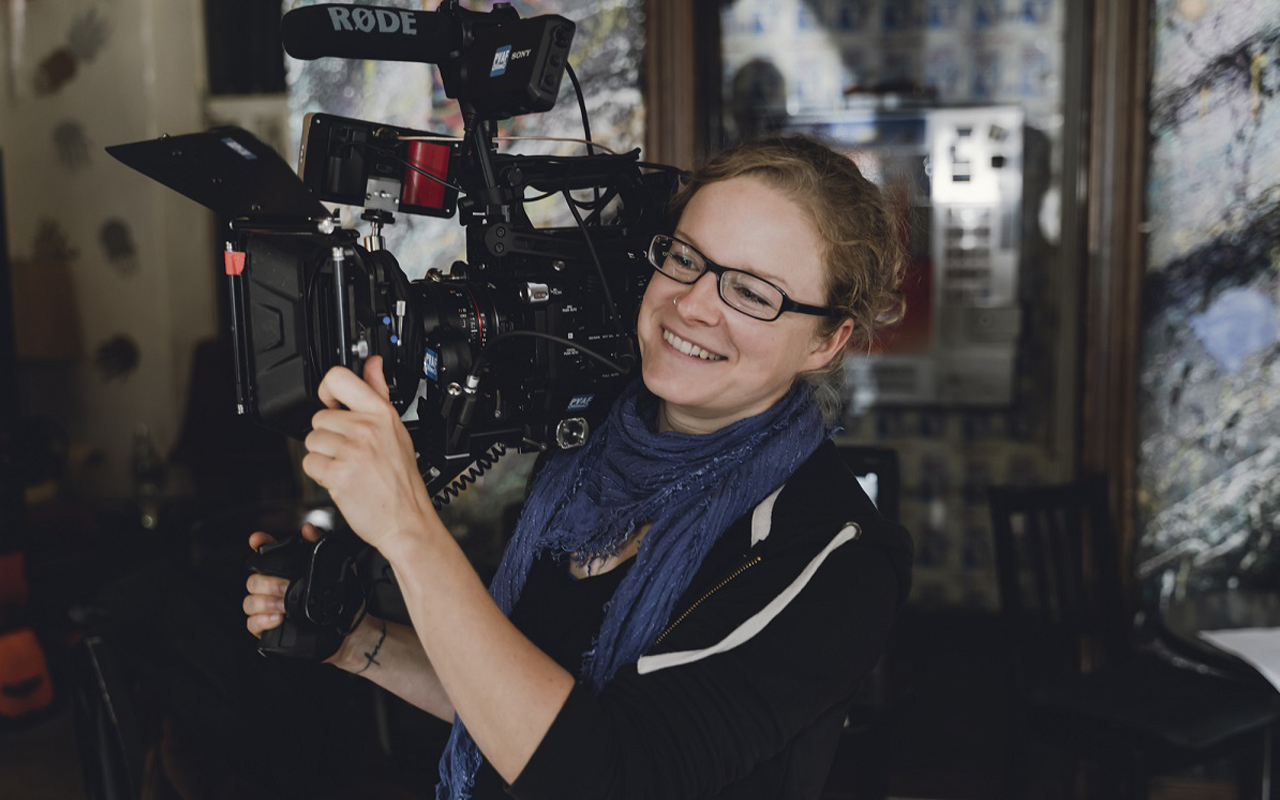
Film Camerawork Workshop: Professional Film Camerawork
€275,00 – €299,00
Level:
Beginner.
Language:
The course is taught in English
Dates:
Sat. TBD – 09:00 – 16:00
Sun. TBD – 09:00 – 16:00
Location:
Space Meduza, Skalitzer Strasse 80, 10997 Berlin, Germany
Contact:
alex@berlinfilmcommunity.com
This will be a very hands-on workshop that will be a mix of demonstration, practical exercises, and useful camerawork theory. You will learn how to set up both a Sony mirrorless camera, as well as the Sony FX6 cinema camera. You will attach accessories you would normally find on a film set to make these cameras ready for shooting. You will also learn how to break down, prepare for, and shoot a simple, pre-scripted scene with all participants getting to perform the different camera department roles. If you’re looking to advance your camerawork knowledge this workshop will help you take a few big steps down that road.
Budget Camera
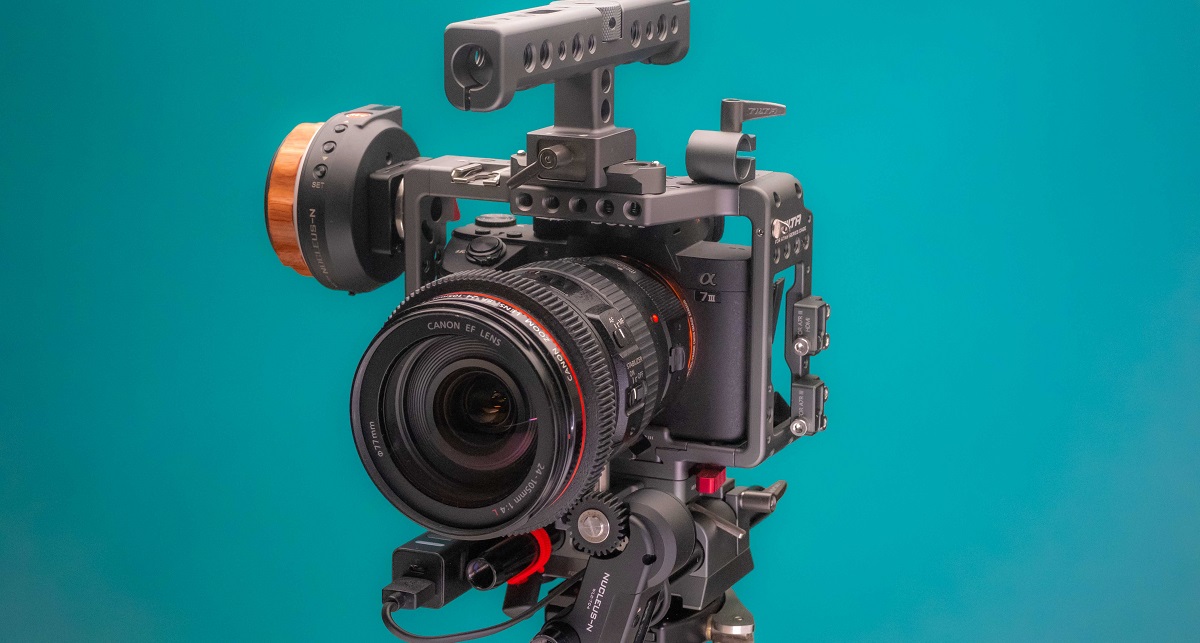
There will be two levels of cameras provided. A Sony mirrorless camera rigged up as it would be for a single operator on a low budget shoot. You will see one way to equip and use this type of hybrid photo/video camera with a focus on getting as close to the functionality of a film camera as possible. This set up is great for run and gun shooting, event work, and simple documentary or narrative filmmaking.
Cinema Camera

You will also get to work on the higher end of the spectrum, getting hands-on time with a Sony FX6, which is a professional level cinema camera that is often used on medium to larger budget commercial and film sets and can be rigged with all the modern accesories commonly being used by professionals.
The Accessories
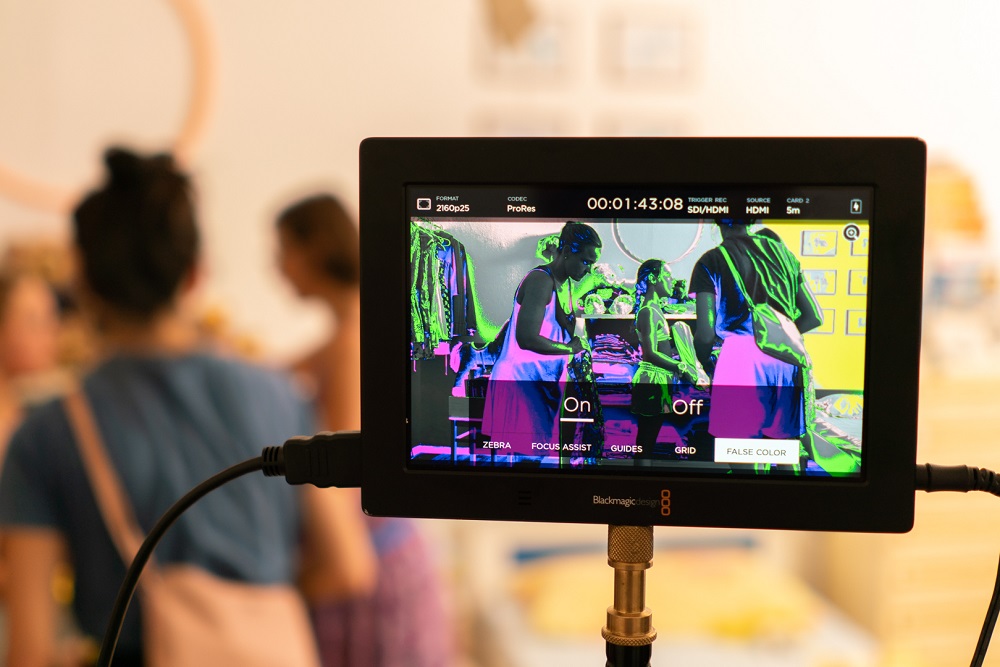
The tools you will get to work with make the process of filmmaking smoother, allow for more precision and specialization, and make everyone’s job simpler. You will learn what the different tools used on film productions are, a detailed explanation of how to set them up, what they do, and how to troubleshoot them should they not work. The tools you will learn include a wireless follow focus which allows a second person to control the focus, an external monitor, which has settings that allow you to analyze exposure, see the image more clearly, and give you a better idea of what the final image could look like, and a gimbal for the hybrid camera, which allows you to get smooth tracking shots.
Camerawork Theory
While this is a very hands-on workshop, I feel that learning camerawork techniques and theory is also extremely important. The camera and accessories are tools which you learn so that you can get better at the creative aspects of filmmaking. In the theory section we will go over framing and composition, how to move the camera, and how to tell a story visually.
I will also show you the basics of how to break down a scene. We will look at the tools which help different departments collaborate effectively and also help a set run efficiently. Shot lists, storyboards, and the production schedule are some of the tools that can break a script down into the individual shots that best tell our story and let everyone know what needs to be done and when. We will create our own shot list and schedule and plan our own shoot based on the already written script. We will then shoot that script as a lean, mean, filmmaking team.
Camerawork in Practice
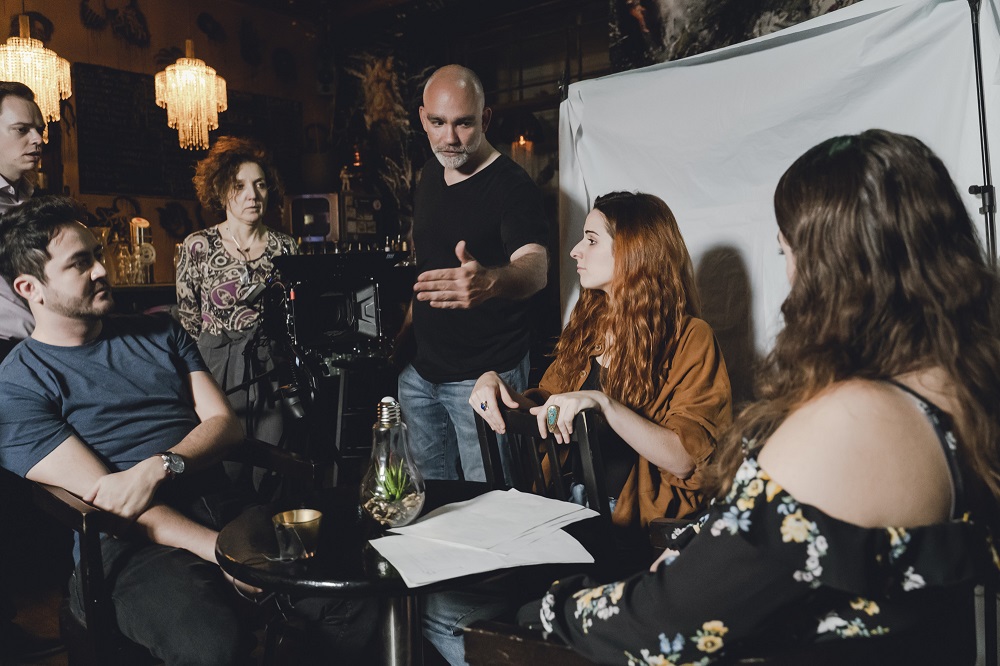
Everyone in the class will get the opportunity to set up both cameras, use all the accessories, such as the follow focus, and shoot part of the scene. As we do this, we will rotate through the different roles, with everyone working diligently, as it would be on a film set. We will put our plan into action and tell our story as well as possible.

Budget Camera
There will be two levels of cameras provided. A Sony mirrorless camera rigged up as it would be for a single operator on a low budget shoot. You will see one way to equip and use this type of hybrid photo/video camera with a focus on getting as close to the functionality of a film camera as possible. This set up is great for run and gun shooting, event work, and simple documentary or narrative filmmaking.
Cinema Camera
You will also get to work on the higher end of the spectrum, getting hands-on time with a Sony FX6, which is a professional level cinema camera that is often used on medium to larger budget commercial and film sets and can be rigged with all the modern accesories commonly being used by professionals.


The Accessories
The tools you will get to work with make the process of filmmaking smoother, allow for more precision and specialization, and make everyone’s job simpler. You will learn what the different tools used on film productions are, a detailed explanation of how to set them up, what they do, and how to troubleshoot them should they not work. The tools you will learn include a wireless follow focus which allows a second person to control the focus, an external monitor, which has settings that allow you to analyze exposure, see the image more clearly, and give you a better idea of what the final image could look like, and a gimbal for the hybrid camera, which allows you to get smooth tracking shots.
Camerawork Theory
While this is a very hands-on workshop, I feel that learning camerawork techniques and theory is also extremely important. The camera and accessories are tools which you learn so that you can get better at the creative aspects of filmmaking. In the theory section we will go over framing and composition, how to move the camera, and how to tell a story visually.
I will also show you the basics of how to break down a scene. We will look at the tools which help different departments collaborate effectively and also help a set run efficiently. Shot lists, storyboards, and the production schedule are some of the tools that can break a script down into the individual shots that best tell our story and let everyone know what needs to be done and when. We will create our own shot list and schedule and plan our own shoot based on the already written script. We will then shoot that script as a lean, mean, filmmaking team.
Camerawork in Practice
Everyone in the class will get the opportunity to set up both cameras, use all the accessories, such as the follow focus, and shoot part of the scene. As we do this, we will rotate through the different roles, with everyone working diligently, as it would be on a film set. We will put our plan into action and tell our story as well as possible.

Requirements
This workshop is for people who already understand camera basics such as aperture, shutter speed and ISO. This will allow me to focus more on the filmmaking aspects of camerawork and be able to quickly go over the very basics and get more indepth.
The workshop will be taught in English and will be limited to 12 participants to give everyone the opportunity to have as much hands on time as possible.
If you have any questions or would like to learn more about the workshop, reach out to me at alex@berlinfilmcommunity.com.
Schedule
EMPTY
Saturday Sep. 7th – 10:00 – 18:00
- The basics of visual storytelling
- How to use lighting to set a mood.
- Camerawork on set
- How to record audio
- Q&A
Day 1
Saturday, TBD – 09:00 – 16:00
- Brief overview of Exposure triangle and shutter speed for film
- Aperture, shutter speed, ISO
- Exposing for film – Don’t use your histogram
- High speed shutter
- Pushing shutter speed for effect or to gain light
- Exposure tools
- False color, Waveform, Histogram, Zebras
- Protecting your highlights
- Exposing your subject correctly – skin tones
- Light meters & lighting ratios with demonstration
- Maintaining consistency between shots
- Codecs and bit depth
- Raw, Log, compressed codecs
- Picture profiles and LUT’s
- Bit depth briefly explained
- Dynamic range explained
- Camerawork theory
- Different shot sizes and what they mean
- Camera Level – low, high, eye level and their impact
- Camera motion – pan, tilt, dolly when to use them
- 180 degree rule and eye lines
- Breaking down a scene
- Building up a cinema camera package for a shoot
- Build up the Sony a7RII and Sony FX6 – cinema lenses, follow focus, focus monitor, and video village monitor.
- Learn the what, how, and why behind all the different parts
- Camera settings overview for both cameras.
- Q&A & Review
Day 2
Sunday, TBD – 09:00 – 16:00
- Test of knowledge from Day 1 & Q&A
- Scene break down
- Breaking down the scene we will be shooting
- Shot list, storyboard analysis, lighting diagrams
- Determining which shots to group together & why
- Estimating time for each shot set up
- Setting up the camera in a group
- Two teams will work together to set up each camera to be ready to shoot.
- We will create a shooting schedule and shot list, determining how much of the script we think is possible in 2.5 hours.
- Shooting the scene
- Shoot the scripted scene using the schedule and shot list.
- Camera operator, 1st assistant camera (focus puller), 2nd assistant camera, assistant director. We will rotate so everyone gets a chance to perform each role.
- Review of the raw footage
- Evaluate the footage together
Schedule
Day 1:
Saturday, TBD – 09:00 – 16:00
- Brief overview of Exposure triangle and shutter speed for film
- Aperture, shutter speed, ISO
- Exposing for film – Don’t use your histogram
- High speed shutter
- Pushing shutter speed for effect or to gain light
- Exposure tools
- False color, Waveform, Histogram, Zebras
- Protecting your highlights
- Exposing your subject correctly – skin tones
- Light meters & lighting ratios with demonstration
- Maintaining consistency between shots
- Codecs and bit depth
- Raw, Log, compressed codecs
- Picture profiles and LUT’s
- Bit depth briefly explained
- Dynamic range explained
- Camerawork theory
- Different shot sizes and what they mean
- Camera Level – low, high, eye level and their impact
- Camera motion – pan, tilt, dolly when to use them
- 180 degree rule and eye lines
- Breaking down a scene
- Building up a cinema camera package for a shoot
- Build up the Sony a7RII and Sony FX6 – cinema lenses, follow focus, focus monitor, and video village monitor.
- Learn the what, how, and why behind all the different parts
- Camera settings overview for both cameras.
- Q&A & Review
Day 2:
Sunday, TBD – 09:00 – 16:00
- Test of knowledge from Day 1 & Q&A
- Scene break down
- Breaking down the scene we will be shooting
- Shot list, storyboard analysis, lighting diagrams
- Determining which shots to group together & why
- Estimating time for each shot set up
- Setting up the camera in a group
- Two teams will work together to set up each camera to be ready to shoot.
- We will create a shooting schedule and shot list, determining how much of the script we think is possible in 2.5 hours.
- Shooting the scene
- Shoot the scripted scene using the schedule and shot list.
- Camera operator, 1st assistant camera (focus puller), 2nd assistant camera, assistant director. We will rotate so everyone gets a chance to perform each role.
- Review of the raw footage
- Evaluate the footage together
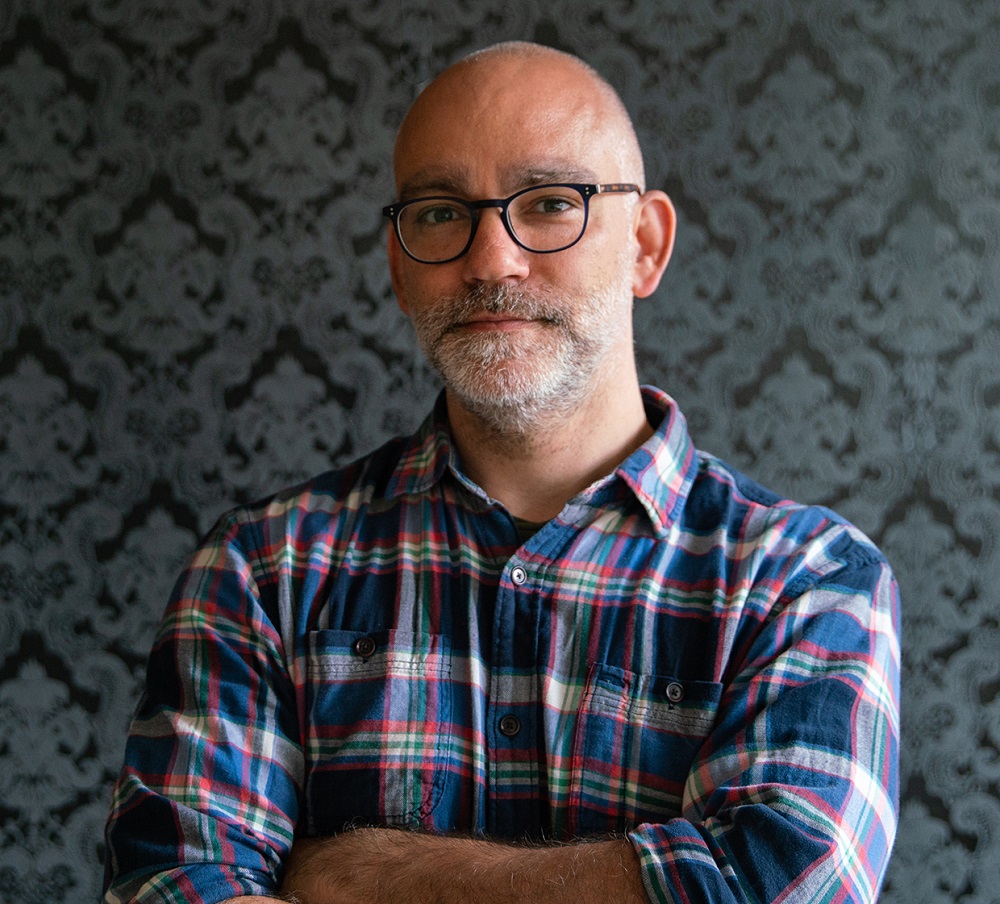
About the Workshop Leader
Hi, I’m Alex DePew and I will be your guide on this filmmaking adventure. I have been working in the film industry for over 17 years and have led many filmmaking workshops. I absolutely love teaching beginners the ropes. I get tons of joy when I see someone light up as they make a connections between what I am teaching and something they have seen in a movie. And when they apply that to their own film it is a thing of beauty.
I am a Cinematographer and Gaffer working primarily on short films, music videos, and commercials. For the 12 years before coming to Berlin I worked on both large and small sets in various roles. I have worked with all kinds of cameras from old school 16mm film cameras up to the Alexa Mini and I have worked on the lighting for no-budget shorts, up through high budget ad campaigns. I grew up in New York City and got my start in film there. I worked my way up the ladder, first as a one-man-band, where I produced, shot and edited content for small commercial projects. Then eventually I moved onto larger commercials in the camera department as a camera assistant. After doing that for several years I moved to New Zealand and continued to work on ever larger projects including commercials for Samsung, New Balance, Corona, Adidas and a host of other large companies. All the time I was always working on the skills I would need to become a good Cinematographer by shooting shorts and helping directors realize their visions.
Together with Linda Paganelli, we run the Berlin Film Community, a community of filmmakers and people interested in film. We host events such as the Pitch & Planning Session and Drink, Watch, Talk. We are nearly 16,000 people strong at the time I’m writing this and I am very proud to be a leader of this community. Helping to teach as well as connect the next wave of filmmakers with each other so they can get their first films made is a great source of joy for me.
If you have any questions or would like to learn more about the workshop, reach out to me at alex@berlinfilmcommunity.com.

Reviews
There are no reviews yet.